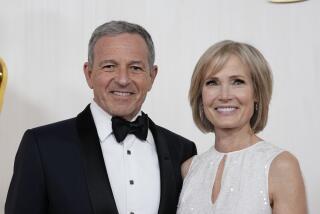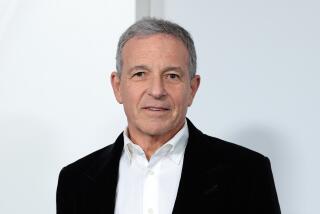Company Town: Disney’s Mega-Merger : PROFILE : The Man Who Built Cap Cities
- Share via
Thomas S. Murphy is known for his corporate parsimoniousness.
The guy is so stingy that when he set about sprucing up his first property at Capital Cities, a ramshackle New York television station in a century-old building, he painted only the two sides that faced the road.
Now Murphy, corporate cost-cutter extraordinaire, is turning over the $6.4-billion company he has shepherded for more than three decades to Walt Disney Co. in a $19-billion merger. When the merger is completed, the 70-year-old Murphy will give up the chairman and chief executive jobs--his second retirement of the 1990s--and become a member of the Disney board.
On Wall Street, Murphy is one of the most admired of media executives. He built a lean and decentralized company in New York-based Capital Cities Communications, engineered the first takeover of a major television network, and then turned the resulting Capital Cities/ABC Inc. into what is widely considered by investors to be one of the best run of media companies.
Capital Cities/ABC’s biggest shareholder, financier Warren Buffett, once paid tribute to Murphy by donning a Salvation Army uniform at a company management meeting and belting out a laudatory tune that Buffett had penned himself.
Murphy was Capital Cities’ very first employee. It was 1954 and the Brooklyn native was hired by a newly formed investment group to run struggling WROW-TV in Albany, N.Y. The group also had bought a radio station in another state capital--Raleigh, N.C. (That’s where the name of the new company, Capital Cities, came from.)
Murphy, who left a manager’s job at Lever Bros., had no interest in media. But the affable Harvard MBA knew a thing or two about business, and proceeded to put the television station back in the black--by saving on paint, among other things.
That winning formula continued. Murphy, who became Cap Cities’ president in 1964, grew his company by swallowing some 30 companies, typically undervalued ones, through friendly acquisitions. The firm finally took on the much larger ABC in 1986.
Although profitable, ABC was burdened with high expenses and sagging ratings, and found itself lagging its competitors at NBC and CBS. The efficient Cap Cities crowd moved in and cut costs dramatically, while continuing to invest in news and entertainment programming. ABC rebounded to become No. 1 in the ratings.
Murphy handed the chief executive job to Daniel B. Burke, company president, in 1990, but got it back in 1994, when he couldn’t dissuade Burke from retiring.
As for his new role as a Disney director, it will keep Murphy “more active than he imagined,” Disney Chairman and Chief Executive Michael Eisner said Monday.
More to Read
Inside the business of entertainment
The Wide Shot brings you news, analysis and insights on everything from streaming wars to production — and what it all means for the future.
You may occasionally receive promotional content from the Los Angeles Times.










